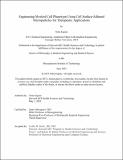Engineering Myeloid Cell Phenotype Using Cell Surface-Adhered Microparticles for Therapeutic Applications
Author(s)
Kapate, Neha
DownloadThesis PDF (8.796Mb)
Advisor
Mitragotri, Samir
Terms of use
Metadata
Show full item recordAbstract
Cell-based therapies present a new frontier for treating previously untreatable diseases. Living cells can innately overcome biological barriers, respond in real-time to biological stimuli, interact with specific cell types, and provide a canvas for further cellular engineering. The crucial role of the innate immune system, and particularly myeloid cells, in the dysregulated biological processes in numerous diseases has come into focus, motivating the development of myeloid cell therapies. The polarization of myeloid cells between classically activated, pro-inflammatory states and suppressive, anti-inflammatory states has myriad effects within the local environment, including metabolic modulation, production of cytokines, and activation of responding adaptive immune cells. As adoptively transferred cells can readily alter their phenotype based on their microenvironments, it is critical to develop a method for controlling cell phenotype in vivo.
In this thesis, I develop a biomaterials approach for tuning myeloid phenotype, specifically differentiating monocytes and macrophages, for pre-clinical applications as cell therapy. I investigate how different myeloid cell phenotypes can be engineered and sustained using cell surface-adhered microparticles, termed “backpacks.” I delve into designing backpacks that load various drug molecules to promote anti- or pro-inflammatory phenotypes. I assess the effect of these microparticles on durability of phenotypic activation and other cellular functions in vitro. Next, I apply this platform to study immune-modulation and therapeutic effect in several disease models. I assess treatment with anti-inflammatory backpacks adhered to monocytes in a mouse model of progressive multiple sclerosis to determine immunomodulatory effects and therapeutic efficacy. Then, I scale up the fabrication of backpack-macrophages and apply this treatment in a clinically relevant porcine model of traumatic brain injury. Finally, I backpack-induced polarization of monocytes into the opposite direction with a pro-inflammatory phenotype, demonstrating the utility of backpacks as a platform technology. I assess treatment of monocytes with pro-inflammatory microparticles in a mouse model of breast cancer to assess tumor microenvironment remodeling and effect on tumor burden. Altogether, this work provides a biomaterials-based approach to tune myeloid cell phenotype ex vivo, for precise control of cell phenotype in vivo.
Date issued
2023-06Department
Harvard-MIT Program in Health Sciences and TechnologyPublisher
Massachusetts Institute of Technology